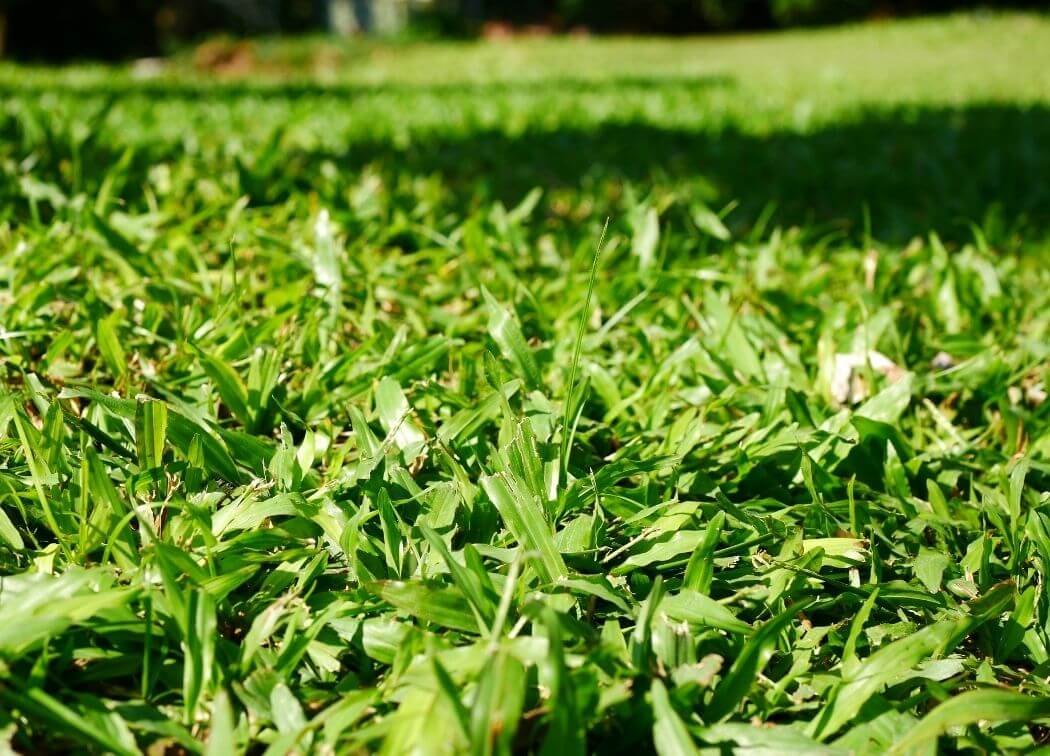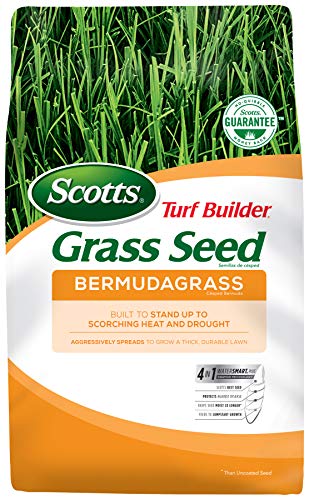Bermuda grass, scientifically known as Cynodon dactylon, is one of the most beloved warm-season grass types because of its rich green color, low-maintanenace requirement, fine texture, and drought-tolerant, high tolerance nature.
While it originated in Africa, Bermuda grass is a perennial forage grass most popular in the US. It works in various soil conditions, germinates quickly, and has a dense growth pattern.
With the amount of Bermuda grass varieties on the market, this grass species will be a stable companion on sports fields, pasture lands, homes, and wherever else grass is needed.
Let’s go over some of the different types of Bermuda grass:
- Blackjack Bermuda Grass;
- Tifway 419;
- Tifsport;
- Tifway II;
- Tifgrand;
- Tifton 85;
- Russell;
- Coastal bermudagrass;
- Yukon; and
- Oasis blend Bermuda grass.
Different Types of Seeded Bermuda Grass
There are two major classifications of bermuda grass types: common Bermuda and hybrid bermuda grass.
Bermuda grass, also known as Cynodon dactylon, is normally poor against the cold and winter, but improved varieties produce seeds that increase resilience and durability in common Bermuda grass.
Hybrid Bermuda grass is any non-seeded variety of turf-grass, growing via Bermuda sod and the like. Hybrid Bermuda varieties differ from common Bermuda grass seed in many ways.
Let’s go over a few differences between these two turf grass varieties.
Common Bermuda Grass Seeds
Common Bermuda grass is also known as seeded bermuda grass. It possesses a light green hue and a rough texture, growing seed heads when they sprout.
This grass germinates fairly quickly, with hulled seeds germinating in 3-7 days.
Common Bermuda is ideal for making forage for grazing and hay-making. Thanks to its higher nutritional value, it is perfect for agricultural settings.
Common bermuda grass is also ideal for areas with heavy foot traffic, such as public parks and sports fields, though only with the denser, improved varieties of Common Bermuda.
Some examples of these common and improved common seeds belong to Blackjack Bermuda grass, Mohawk valley, Ormond Bermuda grass, triangle blend, and Jackpot Bermuda grass.
A major upside seeded varieties have over hybrid varieties is that they are much cheaper and simpler to maintain. Simply water, mow and fertilize as normal.
Recommended Common Bermuda Grass Variety
- Grows under a full sign. Resilient in high traffic, try areas.
- Has 4 in 1 WaterSmart PLUS Coating, which feeds essential nutrients, water, and protects against diseases
- Protects against disease and stays moist
Hybrid Bermuda Grass
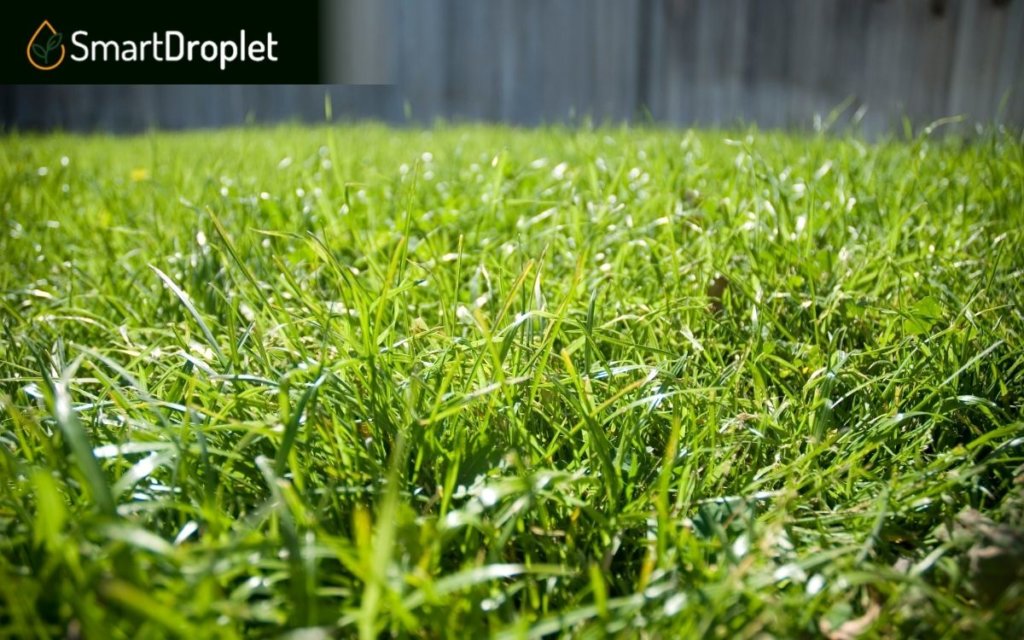
Hybrid bermuda grass varieties receive “sterile vegetative hybrids” because they mix African Bermuda and common bermuda grass. It combines the best of both worlds.
These grass types possess fine leaf texture and a dark green color. They don’t sprout out of the ground like seeded Bermuda grass does, as Hybrid Bermuda grass is vegetative.
Instead of growing via seeds, hybrid varieties are planted through Bermuda sods, plugs or sprigging. Let’s go through each method of growth.
Sods are patches of grass extracted from an existing turf and are replanted in the new desired area. This is how most hybrids ENTER the lawn.
Plugging occurs when seedlings are grown artificially in trays and planted in the desired bed, not in the ground like seeded Bermuda.
Sprigging occurs when sections of grass cut from rhizomes and stolons, sprigs, are planted in the ground. All of these involve planting growing or grown grass into the land instead of seeds.
Some examples of hybrid Bermuda include all of the Tif variants (we go over several on this list), Sunturf and coastal bermuda grass.
Recommended Hybrid Bermuda Grass Variety
- Possesses High traffic tolerance, sun tolerance and drought tolerance
- Possesses a dark green color and medium-fine leaf texture
Bermuda Grass Type Buyers Guide
Having gone over the two main types of Bermuda grass, let’s go over which of these varieties work best in a given occasion and location and which one works for you.
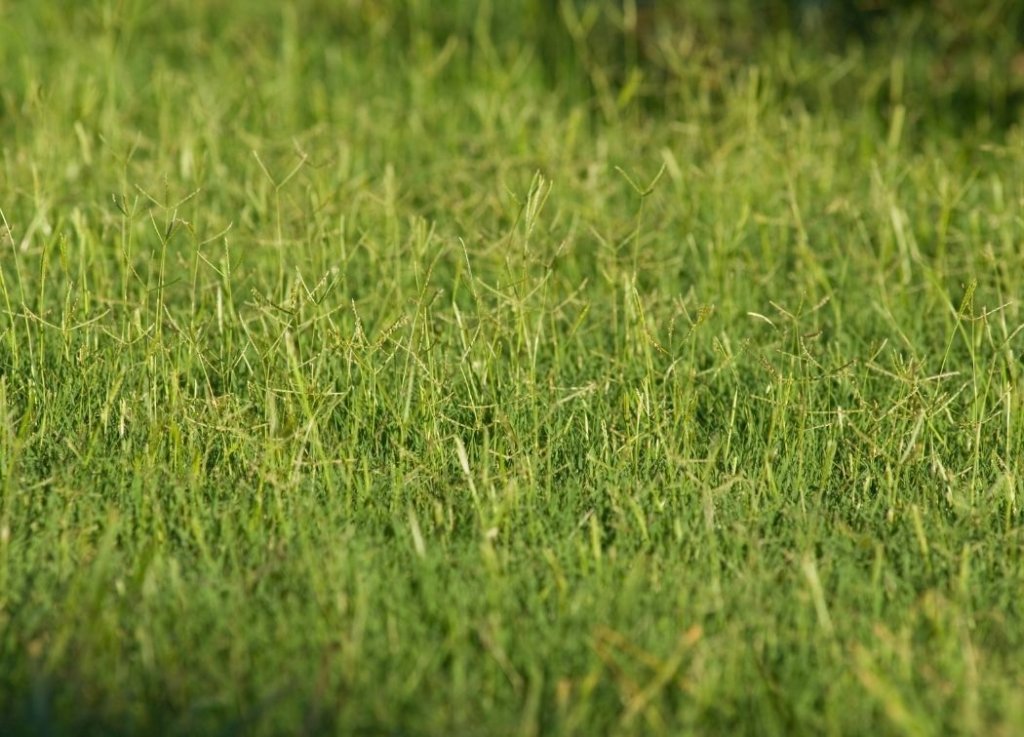
Best Type of Bermuda Grass for Golf Greens
Bermuda grasses have become the sports turf for their ability to withstand heavy foot traffic. Its wear tolerance, thick growth and dense turf make it the sports favorite.
If you’re looking to grow a home lawn or golf course similar to the professionals, golf courses benefit most from Bermuda grass, such as triangle blend and its healing varieties.
The Bermuda grass most suited for golf is the Blackjack Bermuda, various forms.
Blackjack Bermuda Grass
This grass is famous for its vibrant, darker green shade and dense coverage, making it one of the best grass seeds for high foot traffic areas and well-drained soil conditions.
Blackjack is a grass type with great shade tolerance, although it does best at full Sun exposure.
It is best to seed this common grass when the temperature reaches 65 °F at 2-3 lbs of seeds for every 1,000 sq. feet.
Here are some things you can expect from Blackjack Bermuda grass:
- Thick, carpet-like density
- Higher shade, drought and cold tolerance compared to other brands.
- Rapid and consistent germination and seeding rate
I highly recommend Blackjack-brand seeded grass for the needs of your golf course fairways.
Bermuda is a grass blend of drought-tolerant, durable grass varieties.
- The brand is durable, drought-resistant, works well in various soil types and handles foot traffic extra well.
Best Bermuda Grass Type for Home Lawns
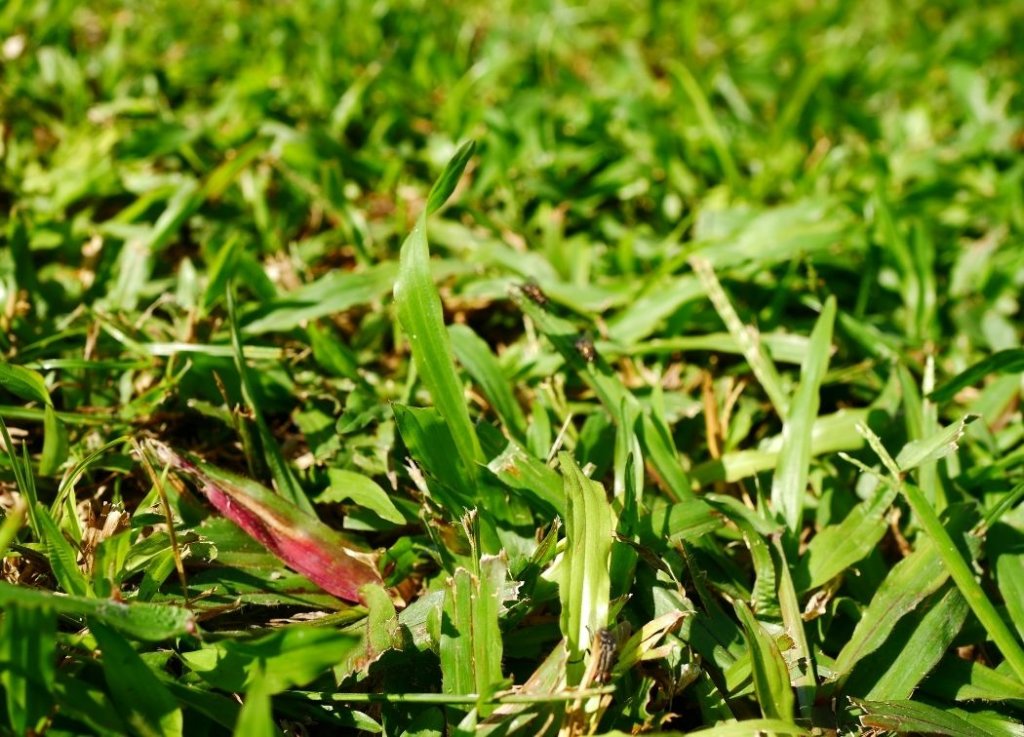
Home lawns are best when they BALANCE OUT aesthetics, giving that lush, uniform green appearance and resistance to diseases and bad weather conditions.
Lawn owners swear by seeded Bermuda Grass for its drought resistance and drought tolerance.
It works on sandy soils and other soil types, and its disease-resistant nature makes it most ideal.
While Ormond Bermuda grass and Jackpot Bermuda grass are usually first on the list for grass types, hybrid varieties are more disease resilient if harder to maintain.
Here are some of the best hybrid Bermuda grasses for your lawn.
Tifway 419
This Tiflawn blend turf grass grows thickly and quickly, making it a heavier duty Bermuda blend that can resist disease, let you mow it low to the ground, and handle dogs running on it.
Tifsport
TifSport hybrid turfs spread via vegetative propagation, they display superior density and texture, and they are winter and cold weather-capable than other kinds of Bermuda.
Tifway II
Improving on the formula of the original Tifway, Tifway II grass boasts a higher shoot density, making it more abundant. It is also more tolerant to frost, snow and parasitic roundworms.
Tifgrand
Tifgrand is a great variety because of its beautiful appearance and ability to retain its color in insufficient nitrogen conditions. It doesn’t produce pollen and is disease resistant.
Tifgrand, known commercially as PP21017, is a fast grower tolerant of shade. It is best to mow once it has grown to two inches.
When it comes to home lawn grass, it’s always best to get grass that combats invasive weeds such as scotch grass and couch grass. It must be strong, resilient, and grows densely.
Best Types of Bermuda Grass for Hay
Pasture grass varieties that are perennial and common Bermuda grass are the most suited for hay production because they can withstand intense grazing, high yield, and quick-drying nature.
Their drought-resistant, low-maintenance nature ensures that Bermuda grass cultivars can be turned into easily packed, stored hay that provides the highest nutritional value possible.
Let’s go over some of the best grass varieties to make hay below.
Tifton 85
Tifton 85 is a hybrid grass between the highly digestible Tifton 68 and the high cold-tolerant South African Bermuda.
Mixing the two strands allows Tifton 85 to maximize the desirable characteristics while minimizing the downsides.
This strain is often established by sprigging when its rhizomes are cut and replanted. It has a high yield quality and digestibility, making it EXCELLENT for animals.
Tifton 85’s large stems and broad leaves make it ideal for hay production, ensuring that your livestock has enough grass to chew on with the right amount of nutrients to sustain them.
Russell
The Russell is known because of how well it handles the cold winters and how well it provides for producers of hay.
When properly moist, the Russell can yield produce qualities that rival the prevalent Tifton 85. Like the 85, it is also established by SPRIGGING it in an area. It grows dense and fast.
Coastal Bermuda Grass
Coastal Bermuda grass was one of the first hybrid forage grass types in the US and is one of the most planted, with over 15 million acres of pasture grass and hay being Coastal Bermuda.
Coastal outclasses its less improved common bermuda grass counterparts by being more robust and resistant to diseases, cold, frost, drought and heat.
It can produce double the forage and fodder compared to other common Bermuda due to its growth length, making it an EXCELLENT and SUPERIOR animal feed.
Other Bermuda Grass Types

Having gone through most commercial varieties that produce pasture grass and turf-grass, let’s turn our narrow grass blades to some honorable mentions among Bermuda types.
Yukon
This common Bermuda coming courtesy of Oklahoma State University has become a mainstay on many golf fields worldwide. It is visually appealing and needs lower maintenance.
This lush green grass is mowed at about 1/4th inch of growth and is seeded at 2-3 lbs per 1000 square feet of land. It will sprout in a brisk 7-10 days under the right conditions.
Yukon seeds start developing rhizomes six to eight weeks after seeding and can be played on two months after it has grown into thick turf.
It grows best with an application of ideal fertilizer, and when it does, it CONSISTENTLY rates highest among Bermuda types due to its outstanding turf quality.
When it comes to Yukon grass, I recommend Outsidepride.
- All-American, family-owned quality company
- cold-tolerant, for USDA zones 7-11
Oasis Blend Bermuda Grass
The Oasis blend comes from the improved common Bermuda Grass variants, making it more resilient, tolerant, and better at adapting to its surroundings.
This genetic diversity allows it to mitigate the shortcomings of the varieties that make it and combine all their strengths. It allows this blend to thus exceed common quality by around 20%.
This excellent growth ability and fair, JACK-OF-ALL-TRADES ability make it a must-have on fairways, in stadiums, and even in lawns and for use as hay.
Here is a list of traits that make Oasis Bermuda Blend an excellent choice for any field:
- Grows a lush green, even light green hue
- .Grows short-medium height and possesses soft, medium-fine texture on its blades
- Above-average drought and cold tolerance can handle traffic well.
There’s also an Outsidepride blend for it when it comes to Oasis.
- Works best in Southern US states
- A mix of three of the leading bermuda grasses, getting all of their strengths and none of the weaknesses.
- Capable of crowding out weeds like scotch grass and couch grass
Conclusion
There are many seeded varieties of Bermuda to suit any of your needs, whether you require common or hybrid grass.
You can find different types of Bermuda grass that will work for you.
Your choice of grass will depend on you and your requirements. It will depend on your Bermuda seed type, usage, and target purpose. Just remember that whatever you choose…
It’s best to choose from Bermuda, or as the professionals call it, the Cynodon dactylon!


